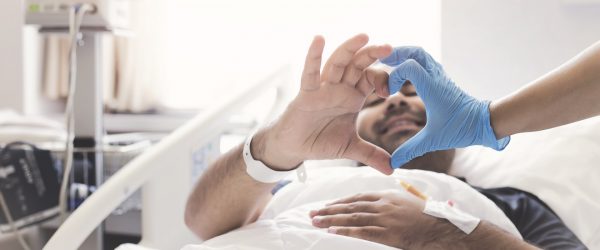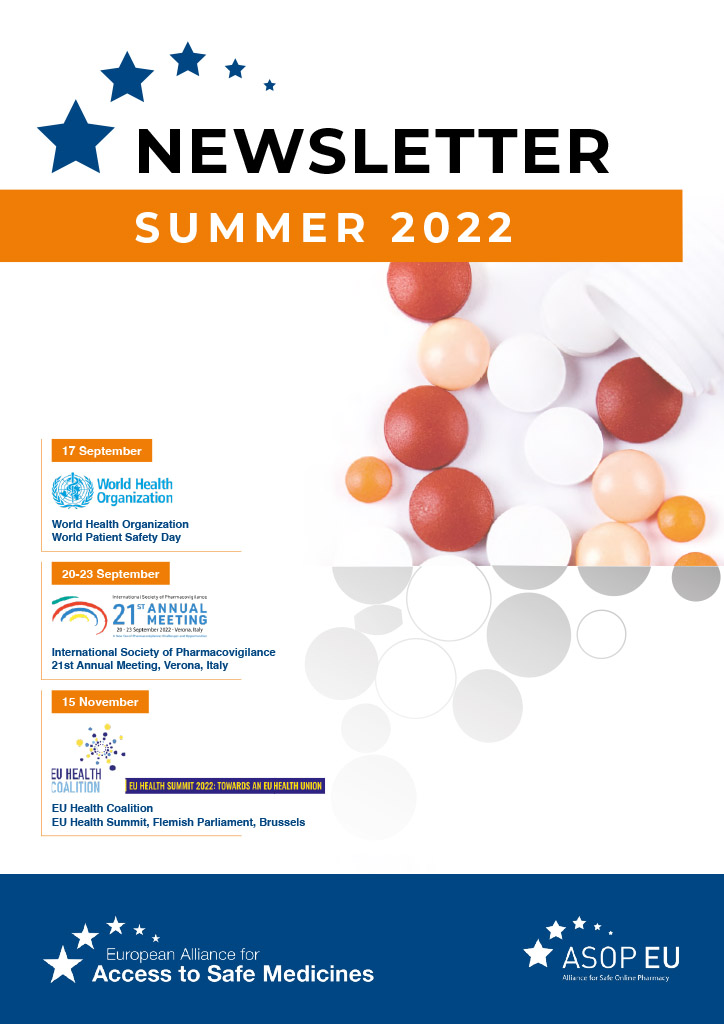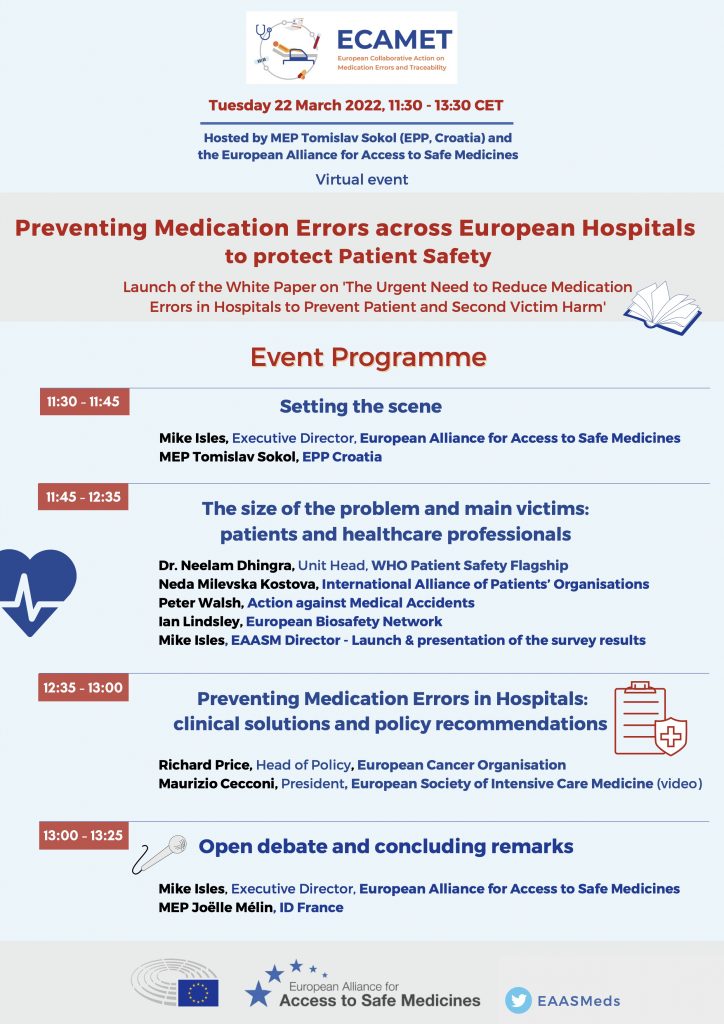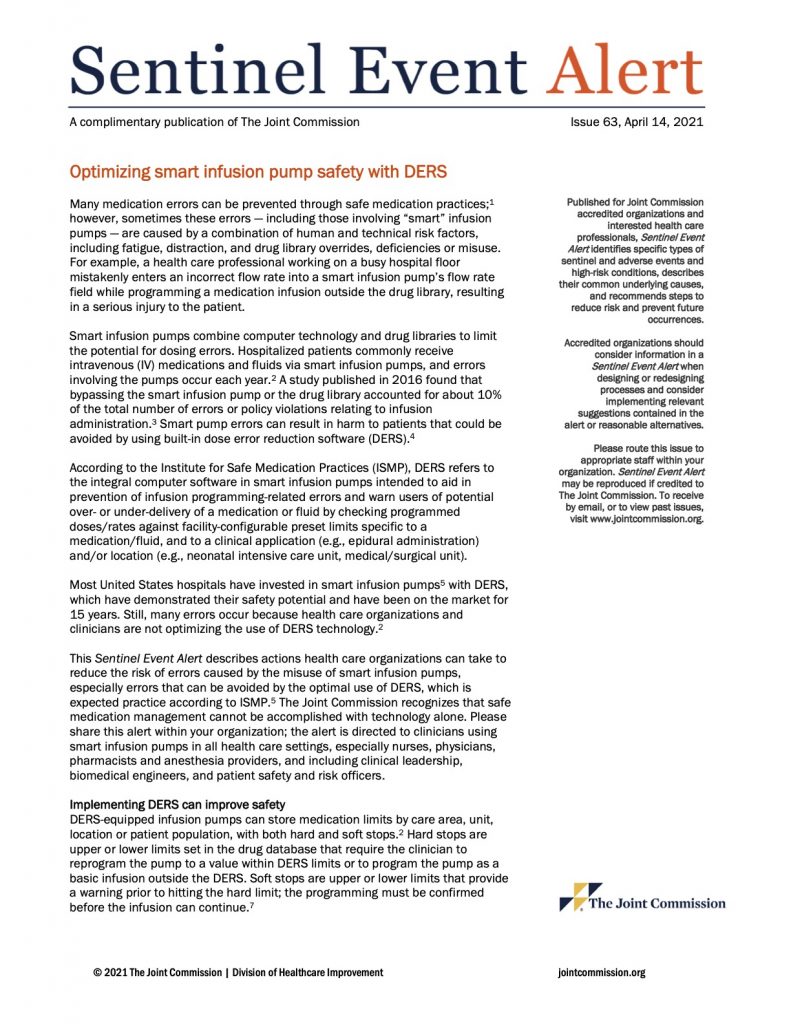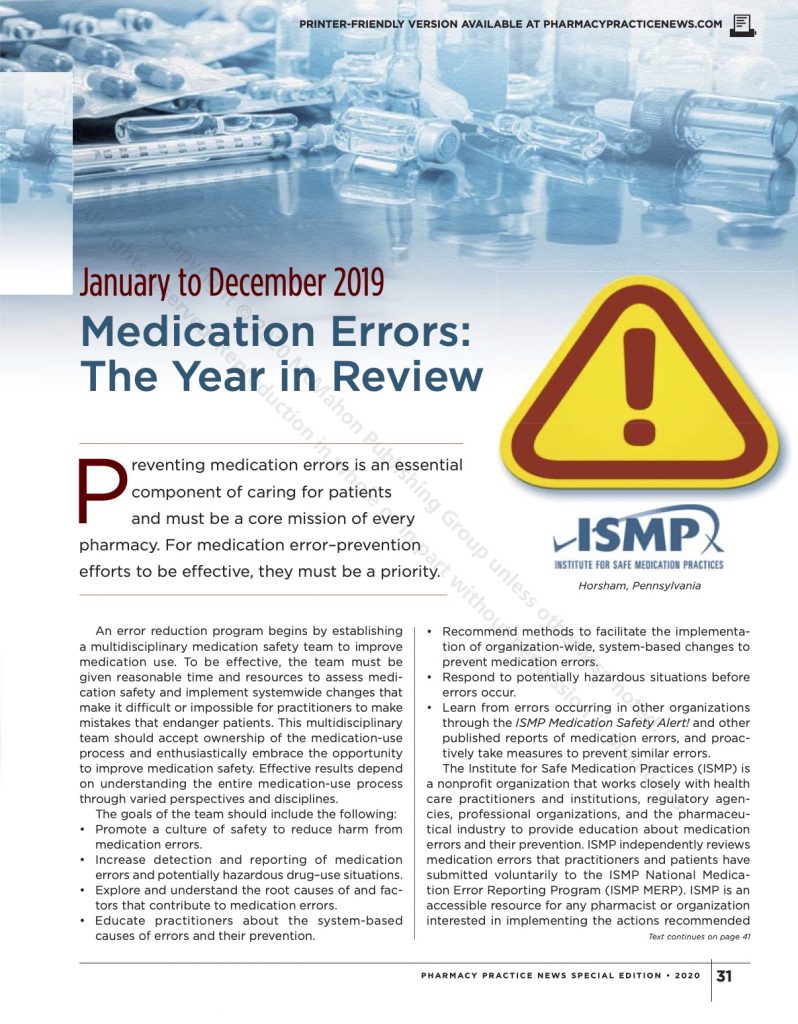News
Press Release: New report highlights dangers to cancer patients when resources are not adequate
A new report written on behalf of the European Collaborative Action on Medication Errors and Traceability (ECAMET) and the EAASM highlights the consequences when there is a lack of staff in complex medical treatment situations such as cancer care.
The report describes the impact of staff shortages and the size of the problem and also the severe impact on staff and family members. It also highlights that numerous electronic traceability systems and automation, being introduced is the most efficient way to reduce medication errors in cancer medication and improve efficiency to mitigate staff shortages.
The foreword which has been co-signed by leading stakeholders namely: All.can, ECAMET Alliance, EHMA and ESNO, the essence of which is summarised here:
“We believe strongly that this issue of increased efficiency through digital solutions combined with the right human resource levels is fundamental to patient safety and enhanced health outcomes. We therefore call upon the EU institutions to address this within relevant legislation to ensure that Member State-wide staff shortages is acted upon with urgency”
Key finding of the report are summarised here:
- There is a shortage of staff to administer complex medication regimens and a lack of human resources can lead to longer waiting times and a spiralling down of standards and efficiency of care
- Higher number of medication errors increase the level of harm (physical and psychological) to patients, their families and healthcare professionals
- Digital solutions can be implemented quickly and efficiently and a study carried out revealed that of the 317 senior hospital pharmacists surveyed across Member States cited the main barriers to this were funding and human resources
About the EAASM
The European Alliance for Access to Safe Medicines (EAASM) is the secretariat for the ECAMET Alliance and is a non-profit independent pan-European patient safety organisation dedicated to protecting patient safety by currently focusing on key medical areas: falsified medicine eradication, reduction of medication errors, a robust regulatory system for follow on nanomedicines and safer use of off label medicines usage.
To find out more about the EAASM visit the website of contact Mike Isles Executive Director at mike.isles@eaasm.eu (+44 7540 462867)
The ECAMET Alliance welcomes another important member – namely the International Society of Pharmacovigilance (ISoP).
The ECAMET Alliance welcomes ISoP as a new Alliance member. This brings the total Alliance membership now to 23 organisations. The International Society of Pharmacovigilance (ISoP) is a professional, independent, non-profit society, open to anyone with an interest in the safe and effective use of medicinal products.
ISoP aims to foster science and learning in pharmacovigilance in all countries and covers all important areas that contribute to better knowledge and understanding of the safe and effective use of medicines, pre- and post-marketing.
ISoP’s main activities are summarised here:
- Problems related to the active components and ingredients of medicinal products
- Problems related to medicines use, e.g.
– Prescription, dispensing, administration errors
– Adherence to the treatment
– Misuse, abuse, recreational use of drugs of addiction
– Poisoning, accidental overdose - Substandard/spurious/falsely-labelled/falsified/ counterfeit (SSFFC) medical products
- Safety problems in relation to mass medication (e.g. vaccines)
- Antimicrobial resistance and other treatment failures
- Benefit-harm assessment and risk management
- Quality issues related to manufacturing, transport or storage
- Environmental effects
- Regulatory matters pertaining to the above
The ECAMET Alliance has a particular focus on medication errors (MEs) and has published a White Paper with a call to action amongst the EU institutions. ISoP therefore brings further emphasis to this important area. With 163,000 deaths attributed to MEs in any given year and with the additional harm to patients and also the “Second Victim” (those healthcare workers involved in an incident), the ECAMET Alliance believes that through digitalisation (traceability systems) then these incidents of patient harm can be radically reduced 1 whilst at the same time freeing healthcare workers from manual activities to allow an enhancement of patient care. The knowledge and expertise of ISoP is therefore a significant addition to the Alliance membership that will add greatly to the Alliance’s activities and standing on this important patient safety topic.
Ref 1 Effect of Bar-Code Technology on the Safety of Medication Administration Eric G. Poon, M.D., M.P.H., et. al., N Engl J – Med 2010; 362:1698-1707, DOI: 10.1056/ NEJMsa0907115
The economics of medication safety: Improving medication safety through collective, real-time learning
Poor medication practices and inadequate system infrastructure—resulting in poor adherence, medication–related harms, and medication errors—too often results in patient harm. As many as 1 in 10 hospitalizations in OECD countries may be caused by a medication–related event and as many one in five inpatients experience medication–related harms during hospitalization. Together, costs from avoidable admissions due to medication–related events and added length of stay due to preventable hospital–acquired medication–related harms total over USD 54 billion in OECD countries. This figure is
equivalent to 11% of total pharmaceutical spending across 31 OECD countries for which data are available.
Beyond medication–related harms, the more rational use of medicines can open significant opportunities to improve patient outcomes. Almost half of all patients receive prescriptions for medications that do not meet their clinical needs—medications with inappropriate dosing or duration, or even a completely inappropriate medication altogether or medication when an alternative intervention may be as—or more–effective. Beyond this, estimates suggest that half of all medicines (those prescribed, purchased, or dispensed) are not taken appropriately. This sub–optimal use of health care resources is accompanied by out–of–pocket costs for consumers and high costs for health systems and needs to be addressed. There exist a number of mechanisms to promote rational use of medicines, for example, use of clinical guidelines, drug and therapeutics committees, digital innovations, and audit and feedback to improve prescribing behaviour. There is also potential for improving rational use of medicines through regulatory and economic interventions, supported by robust evaluation alongside implementation.
PRESS RELEASE: Medication Errors – the Most Common Adverse Event in Hospitals Threatens Patient Safety and Causes 160,000 Deaths per Year
It is no coincidence that Dr. Neelam Dhingra, Unit Head of WHO Patient Safety Flagship, recently stated that unsafe medication practices and medication errors are a leading cause of avoidable harm in healthcare systems across the world. Medication related harm represents 50% of all preventable harm in medical care, with prescribing and monitoring errors contributing to the highest sources. The cost associated with medication errors has been estimated globally at 42 billion dollars annually1, not counting lost wages and productivity.
The WHO is thus committed to the eradication of medication errors and launched a global initiative called “The Third Global Patient Safety Challenge: Medication Without Harm” in 20172. The aim of this initiative is to reduce medication errors and the associated harm in all countries around the world by 50% within 5 years. It is in this context that ‘Medication Safety’ has been selected as the theme for World Patient Safety Day 2022, with the slogan ‘Medication Without Harm’3.
The WHO estimates that there is one death per 1 million of population which caused by medication errors. In the EU with a population of 447 million this would equate to 163000 deaths per year. Further evidence of deaths caused by medication errors In Europe taking statistics from Spain4, Germany5 and the US6 cause between 60,000 and 131,000 deaths per year.
To commemorate the World Patient Safety Day 2022, the WHO is organising a series of webinars on medication safety and is producing several medication safety solutions and technical products in 2022. To support this global, remarkable campaign, the ECAMET Alliance7 (European Collaborative Action on Medication errors and Traceability) takes step to raise awareness of the high burden of medication-related harm due to medication errors and unsafe practices, and advocates urgent actions to tackle these major patient safety issues.
The ECAMET Alliance comprises twenty-two organisations committed to the formation and promotion of regulations and/or guidelines on medication traceability to prevent medication errors in Europe and amongst policy makers within the EU.
Clinical evidence shows that the introduction of medication traceability systems in hospitals is the most effective way to minimise medication errors, bringing about a potential an overall medication error reduction of 58%.8 Medication traceability systems include electronic prescription, electronic preparation, barcode medication administration and smart pumps, all connected to health records and hospital management systems.
An ECAMET commissioned survey9 revealed the low implementation of medication traceability systems in European hospitals.
Pharmacists clearly identified the most important areas to reduce medication errors were traceability systems such as electronic prescription, medication error surveillance and barcode medication administration systems. In addition, they identified that funding, human resources and lack of trained staff was listed as main barriers for implementing these improvements.
Given the magnitude of medication errors occurring and the lack of consistency and harmonisation of processes and the low implementation of medication traceability systems across European hospitals, the ECAMET Alliance believes that key actions need to be implemented and include10:
- Include medication safety in the Pharmaceutical Strategy for Europe, in the EU general pharmaceutical legislation and in Europe’s Beating Cancer Plan through medication traceability systems in a healthcare setting to minimise medication errors;
- Prioritise strategic investments in medication traceability systems in the EU4Health program to minimise medication errors;
- Foster the development and implementation of ECDC guidelines and key indicators on
medication errors in EU healthcare settings; - Facilitate the systematic exchange of best practices between healthcare providers both at
European and national levels to reduce medication errors in healthcare settings.
If you want to read more, you can find the press release here.
ABOUT THE EAASM
The European Alliance for Access to Safe Medicines (EAASM) is an independent, non-profit pan- European Community Interest Company dedicated to protecting patient safety. The Alliance champions many patient safety issues to enhance medical practices, including the development of a robust and harmonised EU regulatory framework in the field of nanomedicines to protect patient safety. Other key activities include campaigning for the safer use of unlicensed/off-label medicines, better harmonisation of compounding practices, and the exclusion of falsified and substandard medicines from the supply chain. To find out more about the EAASM, please visit the website https://eaasm.eu/en-gb/ and follow @EAASMeds on Twitter.
FOR FURTHER INFORMATION
Contact EAASM Director Mike Isles: mike.isles@eaasm.eu or the Secretariat: laura.cigolot@eaasm.eu
- WHO calls for urgent action to reduce patient harm in healthcare, 2019
- WHO Medication Without Harm https://cdn.who.int/media/docs/default-source/patient-safety/strategic-framework-medication-without-harm86c06fafdf0b4294bd23ec9667dfb95d.pdf?sfvrsn=b5cb2d66_2
- WHO World patient safety day 2022 https://www.who.int/news-room/events/detail/2022/09/17/default-calendar/world-patient-safety-day-2022
- Medication errors – third cause of death in Spain https://www.fidhs.org/new-extend/los-errores-en-la-medicacion-tercera-causa-de-muerte-en-espana
- Study: Hospital error kills 20,000 each year https://www.thelocal.de/20140121/more-die-from-hospital-mistakes-than-on-roads/
- Medical errors kill almost 100,000 Americans a year BMJ. 1999 Dec 11; 319(7224):1519.https://www.ncbi.nlm.nih.gov/pmc/articles/PMC1117251/#:~:text=An%20expert%20panel%20from%20the,to%2098000%20Americans%20each%20year
- The ECAMET Alliance website www.ecamet.eu
- Effect of Bar-Code Technology on the Safety of Medication Administration Eric G. Poon, M.D., M.P.H., et. al., N Engl J – Med 2010; 362:1698-1707, DOI: 10.1056/ NEJMsa0907115
- Survey reports and interactive dashboard of results https://ecamet.eu/ecamet-white-paper/
- ECAMET White Paper – The Urgent Need to Reduce Medication Errors in Hospitals to Prevent Patient and Second Victim Harm https://ecamet.eu/wp-content/uploads/2022/05/ECAMET-White-Paper-Call-to-Action-March-2022-v3.pdf
EAASM / ASOP EU Summer 2022 Newsletter
Despite the last year being partially eclipsed by the aftermath of the pandemic, I am happy to report that the EAASM (and also ASOP EU) has had a most productive period.
Of real significance have been two vital patient safety projects. In last year’s opening remarks, I spoke about a new initiative to enhance patient safety by reducing medication errors through digitalisation and the use of traceability systems. At that time we were about to embark on a major pan European survey using IPSOS Mori. This is now complete and revealed some astonishing results. Variability across the countries is pronounced. We have published the results on the ECAMET website and we have constructed a unique interactive dashboard to compare and contrast between Member States (and the UK) results. I would encourage you to view this important piece of work. This study forms the bedrock of the White Paper Call to Action “The Urgent Need to Reduce Medication Errors in Hospitals to Prevent Patient and Second Victim Harm”. We are now campaigning on many fronts to raise awareness and as far as possible, enable this topic to be addressed via a number of EU Institutional instruments.
EVENT SUMMARY: Event summary of the roundtable event on “Preventing Medication Errors across European Hospitals to protect Patient Safety” held on 22nd March 2022 11:30-13:30 CET
The European Alliance for Access to Safe Medicines (EAASM) along with the members of the European Collaborative Action on Medication Errors and Traceability (ECAMET), organised a Parliament roundtable debate (held virtually) on “Preventing Medication Errors across European Hospitals to protect Patient Safety”, bringing together high-profile speakers from the European institutions, international organisations, and health NGOs.
The meeting represented the launch of a comprehensive White Paper on the urgent need to reduce medication errors in hospitals to prevent patient and second victim harm. The document gathers the results of a Pan-European survey on medication errors and traceability, conducted amongst 317 European hospitals, with the aim to discuss areas of improvement, and thus stimulate policymaker’s attention to intensify and implement actions to address this major patient safety issue. EAASM Executive Director Mike Isles kicked off the discussions outlining the serious consequences medication errors can bring about, not only for patients but also for the second victims, such as healthcare professionals. Medication errors can occur at any stage of the medication use process, namely during prescription, transcription, preparation, dispensing, administration and/or monitoring.
The webinar’s host MEP Tomislav Sokol (Croatia, European People’s Party), stressed that before the outbreak of the Covid-19 crisis, healthcare topics had been marginalised in public debates among the EU institutions. Healthcare was perceived as a national competence primarily, even though Member States do not have financial instruments or legal frameworks suitable for the scope, as there are currently at the European level. Differences in terms of medical performances reflected on medication errors, and are caused by different financial resources, a diverse state of health infrastructure and equipment of health personnel. Currently, thanks to the Cohesion Fund and the new budgetary program for health, it is possible to invest within healthcare systems. MEP Sokol outlined the need of data sharing and welcomed the upcoming Commission proposal on the European Health Data Space, to be adopted in May 2022.
Dr. Neelam Dhingra, Unit Head of WHO Patient Safety Flagship, pointed out that unsafe medication practices and medication errors are a leading cause of avoidable harm in healthcare systems across the world. Medication related harm represents 50% of all preventable harm in medical care, with prescribing and monitoring errors contributing to the highest sources. The cost associated with medication errors has been estimated globally at 42 billion dollars annually, not counting lost wages and productivity. It is in this context that ‘Medication Safety’ has been selected as the theme for World Patient Safety Day 2022, with the slogan ‘Medication Without Harm’.
Another valuable contribution was made by Dr. Neda Milevska-Kostova, Board Vice-Chair of the International Alliance of Patients’ Organisations (IAPO), who raised the patient voice during the meeting. Patients are often considered as end users of the healthcare service, feeling both the negative and positive aspects of healthcare, from diagnosis to follow-up. Dr. Neda called for greater interaction and engagement with patients in the continuum of care, in order to identify, reduce and prevent occurring patient harm across the healthcare systems. In 2020, IAPO established IAPO Patients for Patient Safety (P4PS) Observatory as a single-point global platform for gathering and analyzing patients’ expertise and experience that would feed into the national, regional and global policies aimed at improving safety and quality of care for patients by the patients, with the final goal to build patient-centered healthcare worldwide.
Dr. Peter Walsh, Chief Executive of Action against Medical Accidents (AvMA), put emphasis on the need to ensure absolute transparency, openness, and honesty towards patients. Moreover, the need of a solid regulatory framework has been perceived as a crucial step towards detecting, preventing and reducing the incidence of medication errors.
Mr. Ian Lindsley, Secretary of the European Biosafety Network (EBN), explained how medication errors impact a person’s psychological health. Anxiety is identified as the main mental health disorder that nurses suffered during the COVID pandemic, leading to chronic worse workplace stress. And 30% of the nurses with mental health and psychosocial disorders have been involved in medication errors or adverse events. Nurses, as second victims, have not received any professional or adequate psychological therapy.
Mr. Richard Price, Head of Policy at the European Cancer Organisation (ECCO), regretted the EU’s lack of action in this area, especially since medication errors in the oncology sector can cost patients their lives. Additionally, he shared the call to educate the workforce properly on safety issues.
Prof. Maurizio Cecconi, President of the European Society of Intensive Care Medicine (ESICM) contributed to the debate by referring to and applauding the work done by intensive care units, particularly after the outbreak of the Covid-19 pandemic. He warned about the need to increase the number of intensive care beds in Europe considering Europe’s ageing population. Hence, the need to promote a culture of risk prevention and risk mitigation.
In her closing remarks, MEP Dr. Joëlle Mélin (Identity and Democracy, France) outlined the reasons behind the delay in the prevention and treatment of medication errors and hazards across hospitals. Emphasis must be placed on training and remuneration commensurate with responsibilities; it should never be forgotten that any medication taken involves a chain of responsibilities from which no one can escape. MEP Mélin highlighted that “even with increased automation, digitalisation and robotisation of service operations, the human factor will hopefully remain a fundamental pillar of patient care”.
Institutional and cultural inadequacies have been also mentioned. The fact that only 20% of hospitals allow access to their medication error track record is not acceptable in this modern age where transparency is becoming more and more expected. This is ethically unacceptable, especially for patients.
Overall, the experts agreed on the importance of a cultural change within the medical environment. A transparent communication, greater involvement of governments in providing technological support, have been recurrent threads in the keynote speeches.
The reports reveals many positive aspects within hospitals across Europe whilst at the same pointing to areas that would benefit greatly from development in terms of funding, training and implementation of traceability systems.
The recent White Paper highlights the need to:
- Establishing a culture of safety
- Create strategies to improve communication
- Raise awareness and organising regular multi-disciplinary training meetings
- Systematically use accreditation/certification systems
- Introduce technological tools
In line with these recommendations, the ECAMET Alliance calls on European and national health authorities to commit to:
- Include medication safety in the Pharmaceutical Strategy for Europe, in the EU general pharmaceutical legislation and in Europe’s Beating Cancer Plan through medication traceability systems in a healthcare setting to minimise medication errors.
- Prioritise strategic investments in medication traceability systems in the EU4Health program to minimise medication errors.
- Foster the development and implementation of ECDC guidelines and key indicators on medication errors in EU healthcare settings.
- Facilitate the systematic exchange of best practices between healthcare providers both at European and national levels to reduce medication errors in healthcare setting.
If you require further information and wish to work together, do not hesitate to contact Mike Isles (mike.isles@eaasm.eu) or Laura Cigolot (laura.cigolot@eaasm.eu).
PRESS RELEASE: “The Urgent Need to Reduce Medication Errors in Hospitals to Prevent Patient and Second Victim Harm”
Brussels, 22 March 2022
Ahead of this year’s World Patient Safety Day focused on ‘Medication Safety’, the European Alliance for Access to Safe Medicines (EAASM) is organising an online Parliament roundtable debate entitled “Preventing Medication errors across European hospitals to protect patient safety: Launch of the White Paper on Medication Errors and Traceability”. The EAASM has been coordinating the European Collaborative Action on Medication Errors and Traceability (ECAMET), a patient safety initiative that brings together 21 organisations committed to the creation of regulations and guidelines on medication traceability to prevent medication errors in Europe. Several studies clearly show that medication traceability systems are the best way to address this problem.
Medication errors are the most common adverse event in hospitals, not only in terms of number, but as well in morbidity and mortality, and have significant economic and health consequences. Erroneous use of medication causes greater mortality than traffic accidents, breast cancer or the human immunodeficiency virus (HIV). In addition, healthcare staff involved in an adverse event, the ‘second victims’, may also suffer from emotional harm. This timely event aims at raising awareness about the issue by suggesting possible solutions including better medication traceability systems and improved resources in hospitals.
A comprehensive White Paper on the Urgent Need to Reduce Medication Errors in Hospitals to Prevent Patient and Second Victim Harm is about to be released, collecting the results of a pan- European survey on medication errors. In total there are 25 reports comprising 13 country reports in English, 8 languages translations, a private hospitals report, specialised oncology and ICU reports and one consolidated report. In addition, to enable a comparison between the countries and their reports an interactive dashboard has been created. This allows the use to search by question against criteria such as hospital size, type or area.
The reports reveal many positive aspects within hospitals across Europe whilst at the same pointing to areas that would benefit greatly from development in terms of funding, training and implementation of traceability systems.
The White Paper recommends requirements to reduce medication errors in hospitals and highlights the need to:
- Establishing a culture of safety
- Create strategies to improve communication
- Raise awareness and organising regular multi-disciplinary training meetings
- Systematically use accreditation/certification systems
- Introduce technological tools
The above topics are backed up with scientific proof of effectiveness of such measures with the survey results adding a contemporary view. The 317 completed surveys can be regarded as statistically valid and so adds to the credibility of the Call to Action.
The ECAMET Alliance calls on European and national health authorities to commit to:
- Include medication safety in the Pharmaceutical Strategy for Europe, in the EU general pharmaceutical legislation and in Europe’s Beating Cancer Plan through medication traceability systems in a healthcare setting to minimise medication errors.
- Prioritise strategic investments in medication traceability systems in the EU4Health program to minimise medication errors.
- Foster the development and implementation of ECDC guidelines and key indicators on medication errors in EU healthcare settings.
- Facilitate the systematic exchange of best practices between healthcare providers both at European and national levels to reduce medication errors in healthcare setting. If you would like further information, please do not hesitate to contact Mr. Mike Isles (mike.isles@eaasm.eu). The reports can be found on the official website www.ecamet.eu alongside the interactive dashboard.
ABOUT THE EAASM
The European Alliance for Access to Safe Medicines (EAASM) is an independent, non-profit pan- European Community Interest Company dedicated to protecting patient safety. The Alliance champions many patient safety issues to enhance medical practices, including the development of a robust and harmonised EU regulatory framework in the field of nanomedicines to protect patient safety. Other key activities include campaigning for the safer use of unlicensed/off-label medicines, better harmonisation of compounding practices, and the exclusion of falsified and substandard medicines from the supply chain. To find out more about the EAASM, please visit the website https://eaasm.eu/en-gb/ and follow @EAASMeds on Twitter.
EVENT: Preventing Medication errors across European hospitals to protect patient safety: Launch of the White Paper on Medication Errors and Traceability – 22 March 2022 – 11:30 to 13:30 CET
The European Alliance for Access to Safe Medicines (EAASM) invites you to join its Parliament roundtable debate entitled “Preventing Medication errors across European hospitals to protect patient safety: Launch of the White Paper on Medication Errors and Traceability” , taking place on 22 March 2022 from 11:30 to 13:30 CET, on the ZOOM platform.
The EAASM has been coordinating the European Collaborative Action on Medication Errors and Traceability (ECAMET) with the overall objective to markedly reduce medication errors (MEs) at European and national levels, to protect and enhance patient safety and the quality of health care.
This event will represent the occasion to officially release a comprehensive White Paper on Medication Errors and Traceability, co-written by the EAASM and the members of the ECAMET Scientific Committee, collecting the results of a pan-European survey on medication errors which acts as a catalyst to understand where improvements can be identified and acted upon, and thus stimulate innovation in the hospital setting via proven digital processes and internal dynamic behavioural changes.
Join virtually on 22nd March 2022 – Hurry up and register now! https://www.eventbrite.co.uk/e/preventing-medication-errors-to-protect-patient-safety-tickets-262415831817
Assessment of the implementation of safe medication practices in Intensive Care Units
Launch of the ECAMET pan-European survey to help lay the foundation for enhanced patient safety practices across Europe
Medication errors constitute the highest adverse events in hospitals, not only in terms of number, but as well in morbidity and mortality. If any type of error occurs and reaches the patient, the harm incurred is considered preventable.
After a full year of intense work, the EAASM has launched an important patient safety medication error and traceability pan-European survey. It can be completed in either English, German, Portuguese, French or Italian.
This study is being conducted by Ipsos Mori on behalf of the ECAMET Alliance, the results of which will be used to raise awareness and share best practices. This will help support advocacy for enhanced hospital traceability systems and processes which will ultimately contribute to the reduction of medication errors and thus enhance patient safety.
The survey has been sent to hospital pharmacists in a number European countries (12 in total) and we are very grateful for the support of a number of other Hospital Pharmacy Associations such as France, Italy, Portugal, Spain, the UK and Switzerland.
The final reports will include the ability to analyse the outputs from an inter and intra country perspective using an interactive e-platform.
The EAASM intends to present the survey findings in the Autumn through a high-level roundtable event, which will bring together EU and international authorities as well as a wide range of health stakeholders.
If you would like further information, please do not hesitate to contact us.
Detect Adverse Events and Medication Errors Using Technology
Description of pharmacists’ reported interventions to prevent prescribing errors among in hospital inpatients: a cross sectional retrospective study
Optimizing smart infusion pump safety with DERS
A systematic review of the impact of health information technology on nurses’ time
Medication Administration Errors
Germany passes law to fund hospitals by 3 billion euros

